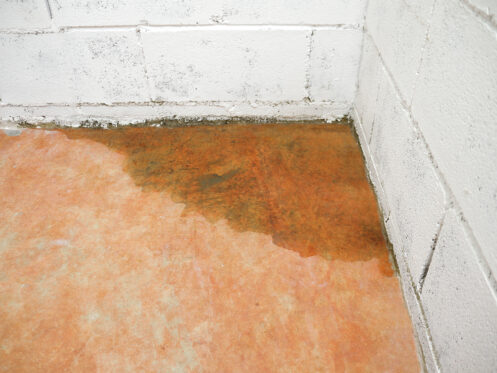Whether it’s from a torrential downpour during a severe storm or a burst pipe, a basement flood can do thousands of dollars’ worth of damage to your home. Fortunately, there are plenty of things that you can do to keep your basement mostly free of water, even during a particularly rainy spring season. Here are a few flooding prevention tips to keep in mind.
1. Install a Sump Pump
Sump pumps are machines that are placed in the lowest point of a home, usually in the basement or in a pit called a sump. The sump pump is typically placed in the sump, which will fill with water before anything else in your home if there is any flooding. When the sump pump detects water above a certain level in the sump, it turns itself on and begins pumping water out of the basement and away from your home. Having a sump pump is one of the best ways to prevent a basement from flooding, so have one installed if you haven’t already.
When you purchase a sump pump for your home, opt for one with a backup battery. Sump pumps are typically powered by electricity and need to be plugged in to work, but that won’t help you if your power goes out. On the other hand, a battery-backup sump pump will keep working even if you lose power during a severe storm. Your sump pump will also require regular maintenance to keep working properly. Check the float switch periodically to make sure it turns the pump on when necessary, and remove any debris that could clog the pump. If your sump pump still isn’t working properly or if you aren’t comfortable cleaning and maintaining it yourself, it may require repairs.
2. Keep Your Gutters in Good Condition
Your gutters allow water to drain from your roof and flow safely away from your home whenever it rains. If they are damaged or become clogged with debris, they won’t be able to do their job. Not only could this do a lot of damage to your roof, but all the water that falls from it will also land next to your house. It could seep into your foundation and into your basement, turning every major spring rainfall into a potential flooding situation.
To make sure that your gutters stay in good shape, have them cleaned at least twice a year – once in the spring and once in the fall. Since this does require someone to climb up to your roof, it’s best to hire a professional who is properly trained and insured to do the job instead of doing it yourself. You should also at least have your gutters inspected and possibly cleaned after a major storm since this is when they are most likely to be clogged with debris. Finally, check your drain spouts. They make up the lower sections of your gutter systems and route water away from your house’s foundation. Check on them to make sure that they’re properly connected to your gutters and that they aren’t clogged or damaged.
3. Rethink Your Landscaping
Proper landscaping can help prevent flooding on your property. First of all, plant trees and shrubs at least 10 feet away from your home’s foundation. You’ll still have all the shade and other benefits of the increased vegetation, but the roots from these plants will be less likely to damage your foundation or block drainage systems.
Second of all, keep mulch at least 6 inches away from your foundation. Having mulch too close to your house can cause water to pool around the base of your home and cause a potential flooding situation. If you have a 6-inch gap, water will drain away from your house instead.
Finally, consider the grading of your lawn. Grading is adding gentle sloping to your yard to allow water to drain away from your house and head near a drainage system. If you have a completely flat lawn, contact a landscaping service about adding some gentle slopes.
4. Seal All Foundation Cracks
Water can seep through the smallest cracks in your foundation, so check your basement for any holes or other gaps you might find and seal them with a waterproofing compound. Not only will this help prevent flooding, but it will also help keep your foundation in good shape.
5. Fix Plumbing Issues as They Arise
While a lot of basement flooding problems are attributed to severe weather, plumbing problems can do just as much damage. Even if burst pipes and leaking water heaters won’t cause a full-blown flood, they can still cause a lot of water damage and contribute to mold growth in your home. That’s why you need to take care of any plumbing problems as soon as they arise. If you notice issues such as low water pressure in your faucets, rising water bills, or standing water anywhere in your home, check your basement. You might have a leak or some other problem. If this is the case, do not try to fix anything yourself unless you have the proper training and tools; doing so could make your problems worse.
6. Keep an Eye on Your Sewer Line
Keeping an eye on your sewer line is admittedly easier said than done. After all, it’s buried underground, and you probably don’t notice it working most of the time. And yet, it can be a cause of flooding in your yard and your basement if something is wrong with it. Look for signs such as foul smells coming from your drains, standing water in your sinks and shower, multiple clogs in your home, and gurgling sounds from your sinks. You can also look for wet or excessively green patches of grass in your yard. All of these are potential signs that your sewer line is blocked or damaged. This can do more than just flood your basement, so keep an eye out for these signs and be prepared to have a plumbing professional inspect your sewer line and make repairs if necessary.
Reach Out to Pioneer Valley Environmental for Assistance
If you have a basement flooding problem that is related to your plumbing or your sewer system, don’t hesitate to turn to Pioneer Valley Environmental for help. We are a plumbing company serving Belchertown, MA and the surrounding areas. We have been providing excellent plumbing services to our many customers since 1999, and we have made it our goal to ensure that all of our clients are safe and comfortable in their homes. We are also available for emergency repairs 24/7, so don’t hesitate to contact us at any time if a burst pipe is flooding your basement.
To learn more about our services and how regular plumbing maintenance can help keep your basement dry, contact Pioneer Valley Environmental at our main office in Ware, MA today. We’ll be happy to answer any plumbing questions that you might have.








